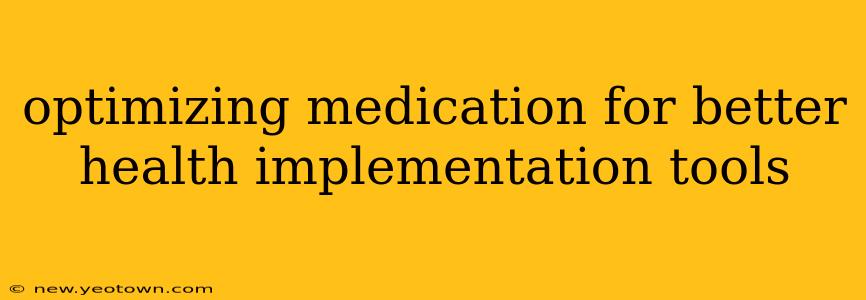Medication is a cornerstone of healthcare for many, managing chronic conditions and acute illnesses alike. But simply taking prescribed medication isn't enough; optimizing its use is crucial for achieving the best possible health outcomes. This journey involves understanding your medications, actively participating in your care, and utilizing various tools and strategies to ensure you're getting the most benefit with the fewest side effects. Let's delve into how you can take control and optimize your medication regimen.
What are the common challenges in medication management?
Many people face hurdles in effectively managing their medications. These challenges can include forgetting to take doses, struggling to understand instructions, experiencing side effects, and affording the medication. These hurdles can significantly impact health outcomes, leading to poorer disease control and potentially serious complications.
How can I improve my medication adherence?
Improving medication adherence is paramount. It's not just about remembering to take pills; it's about understanding why you're taking them and how they're supposed to make you feel better. Here are some practical strategies:
- Set reminders: Use pill organizers, alarm clocks, smartphone apps (many excellent medication reminder apps are available), or even ask a family member or friend to help.
- Create a routine: Integrate medication taking into your daily schedule, connecting it with existing habits like brushing your teeth or having breakfast.
- Keep it simple: Use a clear, easy-to-understand medication list, including dosage and frequency.
- Talk to your doctor or pharmacist: Discuss any concerns, side effects, or difficulties you're facing. They're your best resource for information and support.
What tools can help me manage my medications?
Several tools can simplify and enhance medication management:
- Pill organizers: These containers are designed to hold medications for each day or week, eliminating the need for daily sorting.
- Medication apps: Many smartphone apps offer features like reminders, refill alerts, and medication interaction checks.
- Smart pill dispensers: These devices dispense medications at scheduled times, offering a high level of convenience and adherence support, especially for those with complex regimens or cognitive impairment.
How can I communicate effectively with my doctor about my medications?
Open communication is key. Before your appointment, write down your questions and concerns. Bring a list of all your medications, including over-the-counter drugs and supplements. Clearly explain any side effects you're experiencing, and don't hesitate to express any concerns about affordability or accessibility.
What are the potential risks of not taking medication as prescribed?
Failing to adhere to your prescribed medication regimen can have serious consequences. These can range from a worsening of your condition to the development of new health problems. In some cases, non-adherence can even be life-threatening.
How can I track my medication's effectiveness?
Tracking medication effectiveness involves monitoring your symptoms and overall health. Keep a journal to record how you feel each day, noting any improvements or worsening symptoms. Share this information with your doctor during your appointments, aiding in determining the appropriate adjustments to your treatment plan.
How do I know if my medication is causing side effects?
Side effects vary widely depending on the medication. Common side effects include nausea, headaches, and fatigue. More serious side effects are also possible. If you experience any concerning side effects, contact your doctor or pharmacist immediately.
How can I afford my medications?
The cost of medication can be a significant barrier to adherence. Talk to your doctor or pharmacist about potentially less expensive alternatives or explore patient assistance programs offered by pharmaceutical companies.
Optimizing medication use is a journey, not a destination. By actively engaging in your care, utilizing available tools, and maintaining open communication with your healthcare team, you can significantly improve your health outcomes and experience the full benefits of your medications. Remember, your health is an investment worth protecting, and optimizing medication management is a critical part of that investment.

